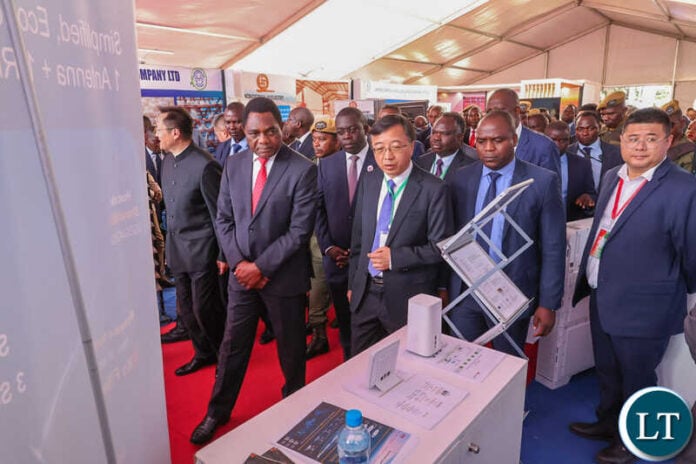President Hakainde Hichilema’s visit to China last year has continued to yield positive results, encouraging investors to establish facilities such as the Jiangxi Bureau of Geology (JBG) mineral laboratory, which is able to test any type of mineral and soil samples from across the country.
Jiangxi Burreau of Geology General Manager, Sterlin Shi, says the over USD$ 3 Million Mineral laboratory, which started its operations this year is expected to assist Zambia meet its projected three million tonnes of copper production per year by 2030.
Speaking in an interview with ZANIS in Lusaka, Mr Shi disclosed that he has established the Mineral laboratory in order to enable the Zambian Government achieve its copper production target.
He observed that in response to the government’s copper production target, his company built the mineral laboratory whose construction works commenced last year and saw its completion in June this year.
“This laboratory is the biggest in the SADC region with the potential to help Zambia to discover different types of minerals because we also do exploration apart from testing samples.
“This laboratory will no doubt assist the country’s projected three million tonnes of copper production per year by 2030,” he said.
He explained that the laboratory is able to test soil, rock and water samples among others, collected from across the country, a move which is helping in identifying areas where to start full mining operations by investors.
And Mr Shi bemoaned the few mineral laboratories in the country, stressing that the facility is going to see more investors set up companies across the country to ramp up copper production and other minerals.
He added that the laboratory needs more mineral laboratory technicians, hence, the company’s intention to sign a Memorandum of Understanding with the University of Zambia, School of Mines to have students do industrial attachments and internships.
“We have engaged the University of Zambia management to be getting students from the school of Mines to be doing industrial attachments so that they acquire skills from their Chinese counterparts to empower local people in mineral testing,” he said.
Mr Shi also noted that the mineral laboratory has helped in creating jobs for Zambians and that going forward, more job opportunities will be created looking at the capacity of the company.
He reiterated that mining plays a crucial role in contributing to the country’s gross domestic product, and that the mineral laboratory is expected to give accurate location results to potential investors where genuine minerals are found for them to start mining.
Mr Shi further expressed happiness that he has set up the laboratory which will be able to give mineral sample results within the shortest possible time, as opposed to the previous years when most mineral testing was done in other countries, which used to take time.
Laboratory Analyst, Rutherford Mukwabanje, explained that he conducts a number of mineral testing using hitech equipment which analyses a number of elements such as copper, manganese and gold among minerals.
Carol Namutengu, also a Laboratory Analyst, urged other female folks to consider undertaking science laboratory courses so that they can take up jobs that are on offer by companies such as JBG.



“We produce what we don’t consume,and consume what we don’t produce” – Patrice Loch Lumumba ,Kenyan intellectual.
Zambia’s cooper exports fall into that trap.
I’ve been all over Zambia s markets. I haven’t seen a single Chinese fruit! South Africa yes.
Thank you Sir we appreciate your untirering service
Go in peace and enjoy your retirement in 2026
You’re one vote,one opinion .Tikki you surely don’t speak for 18m Zambians.
Comments are closed.